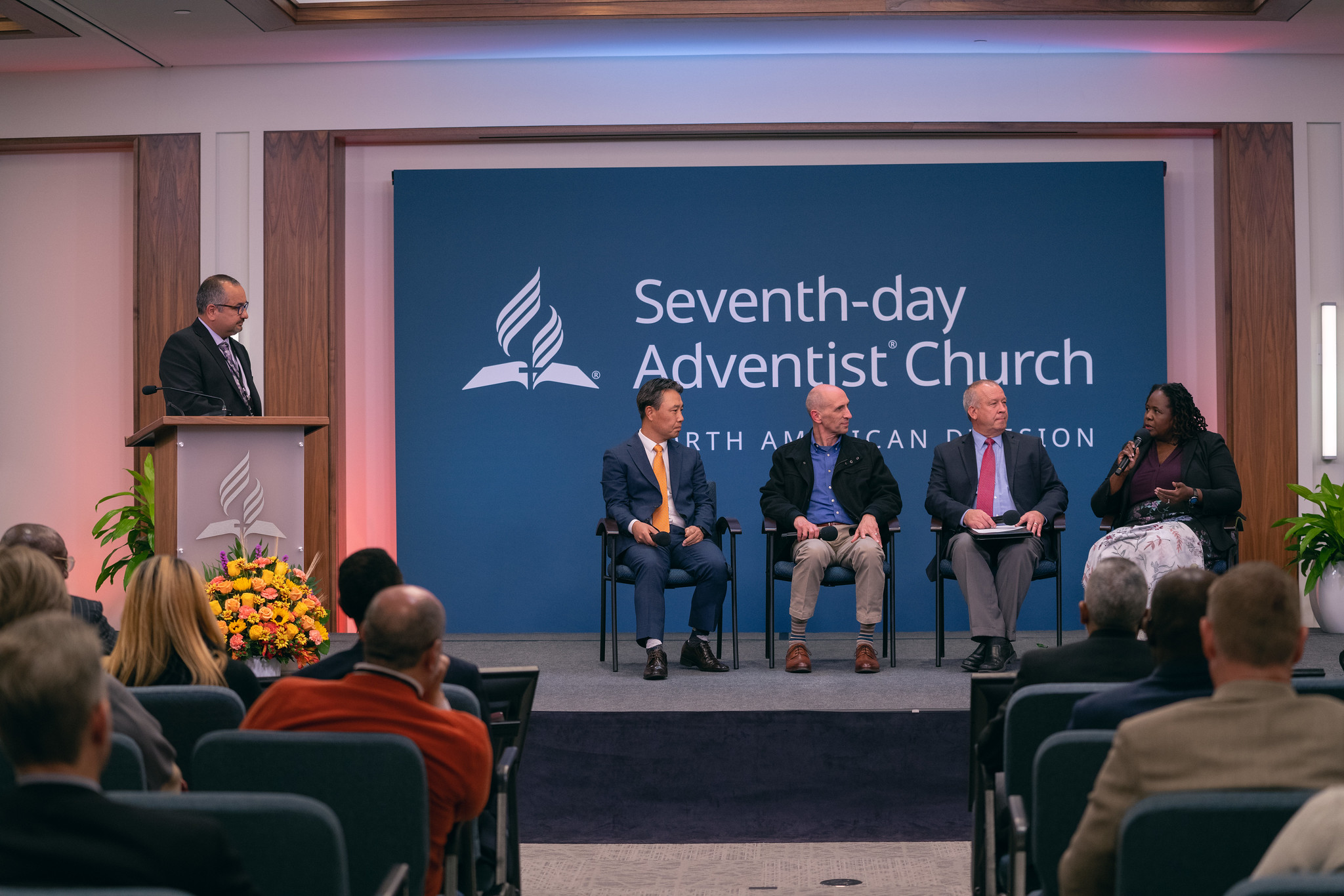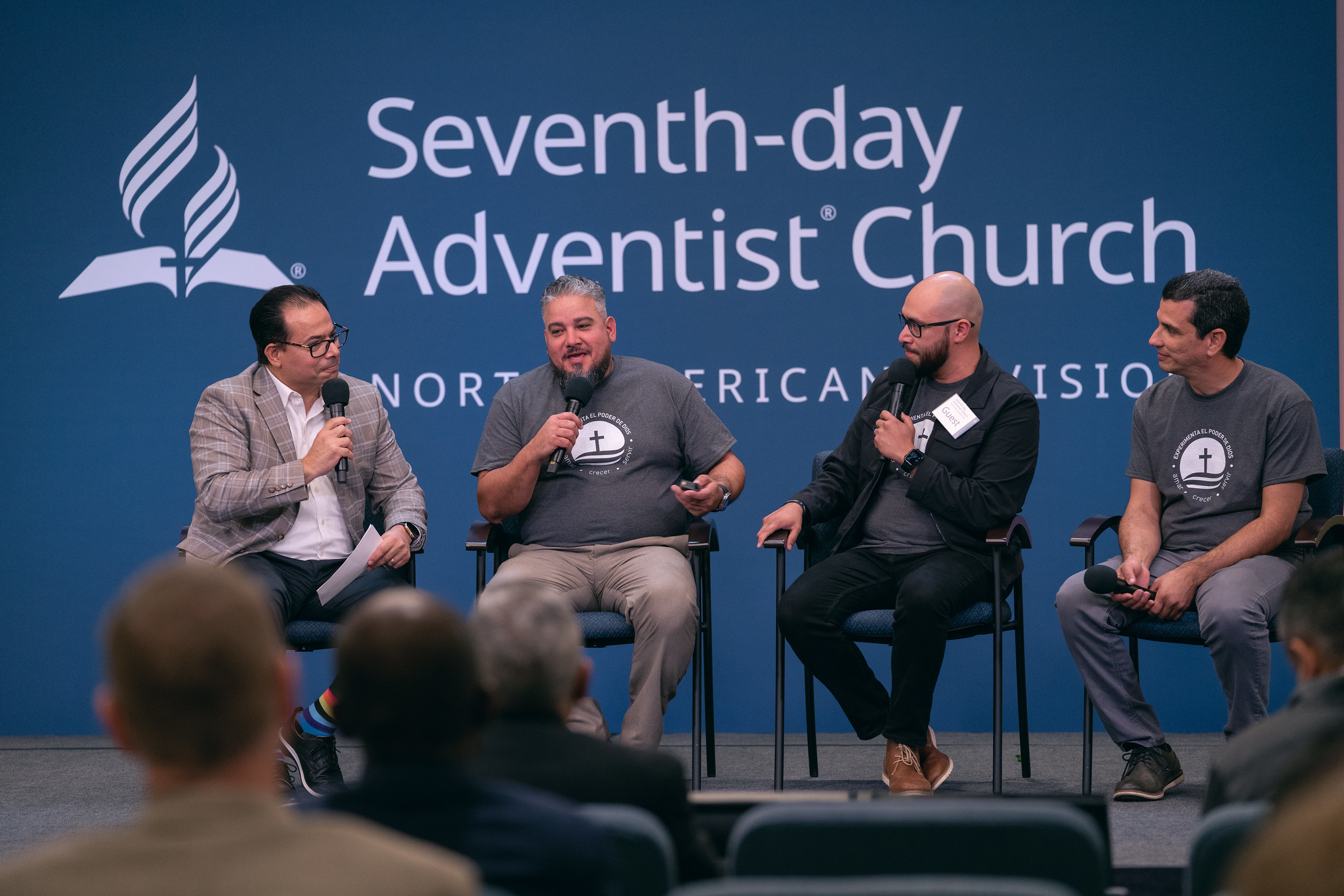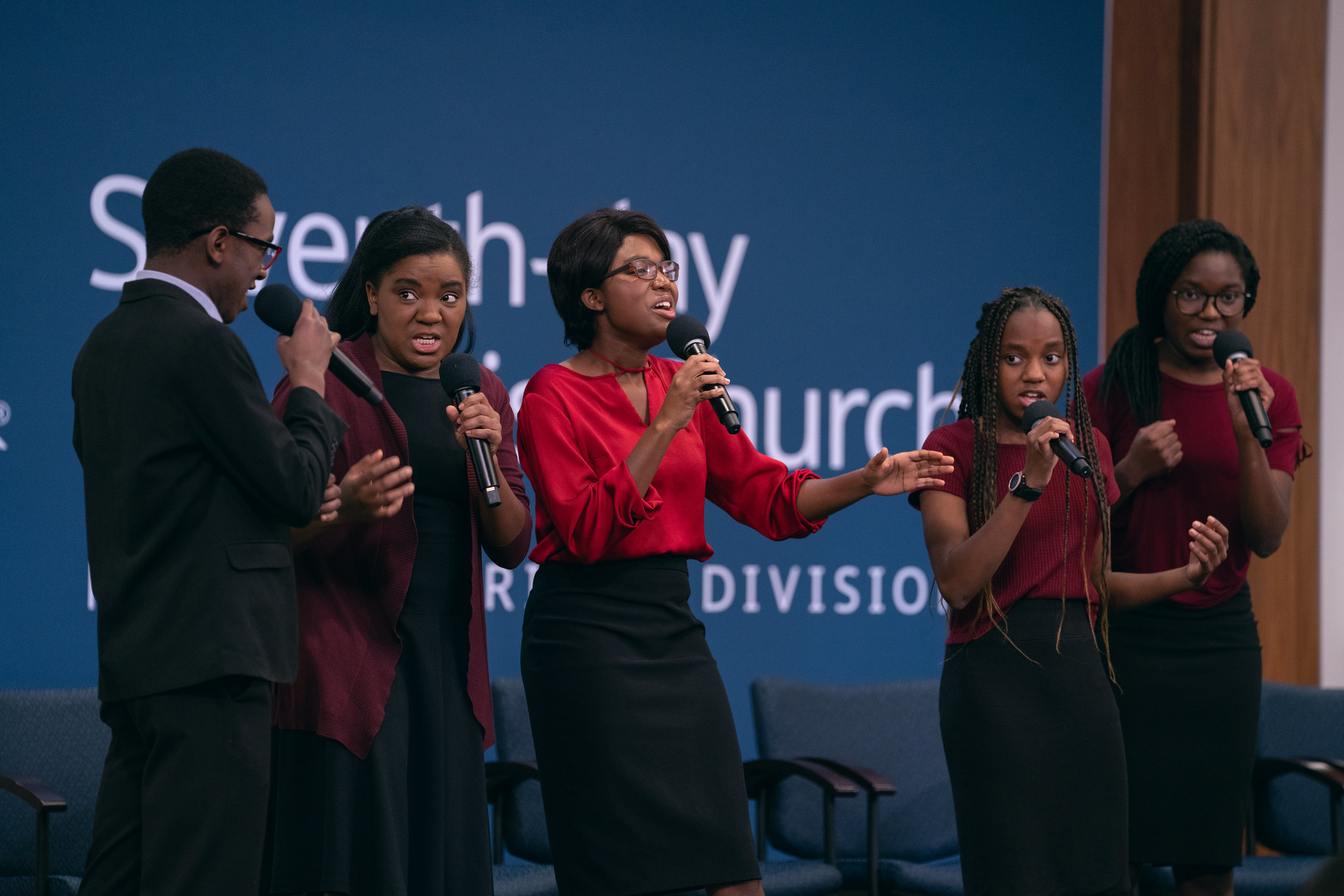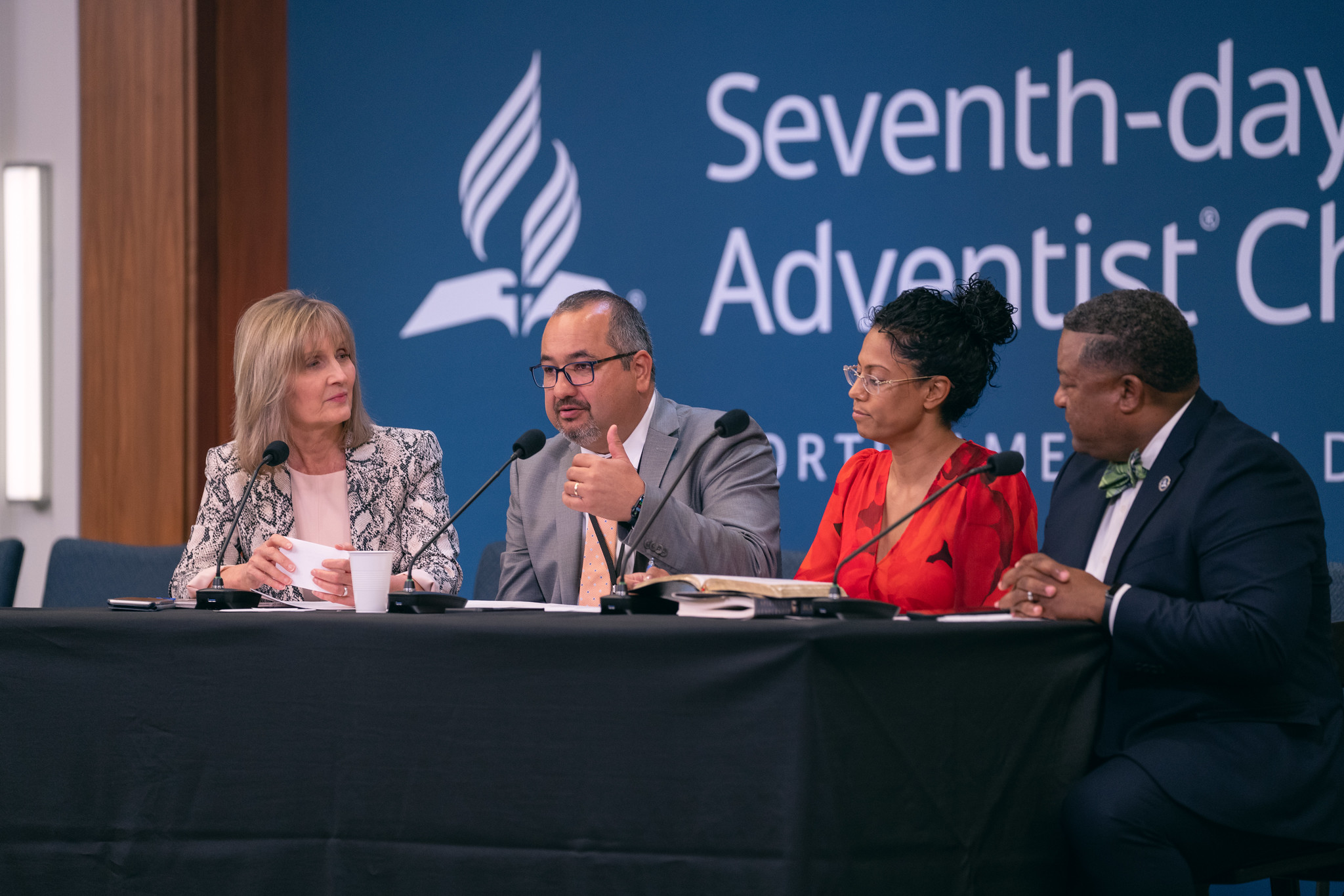
Paulo Macena (left), director of leadership at the NAD, hosts a panel at the 2022 NAD Year-End Meeting on the topic of mentorship with panelists Jonathan Park, president of Southeastern California Conference; Tracy Wood, director of NAD Youth and Young Adult Ministries; Arne Nielsen, vice president for education at the NAD; and Celeste Ryan Blyden, executive secretary for the Columbia Union. Photo by Pieter Damsteegt
In 2021, leaders of the North American Division of Seventh-day Adventists (NAD) voted on three strategic focus areas for the church’s mission: multiply, media, and mentorship. These three areas were the theme of the vespers program on Friday night during the NAD’s year-end meetings at the NAD headquarters in Columbia, Maryland.
“In the early years of Adventism, our leaders — who were, you’ll remember, in their 20s — saw printing as a medium to advance the gospel, and were not afraid to take advantage of this new tool,” commented G. Alexander Bryant, NAD president. “Neither should we today be afraid to take advantage of modern tools to advance the gospel.”
Adam Fenner, director of Adventist Learning Community, reiterated Bryant’s statements with his presentation of a new online platform geared toward turning young people ages 18-35 into social media ambassadors for Christ.
“Some people like to quote Ellen White and say that ‘Christ’s methods are best,’” Fenner said. “I agree. And Christ’s method works very well online.”
In an 1893 letter, Ellen White urged church members to “reach the people where they are.” Rohann Wellington, director of Professional Services at the NAD, added, “They’re in the virtual space, and it’s time for us to connect with them. The right arm of the gospel is the health message, and the left arm is media.”
Acknowledging that not everyone innately knows how to go about utilizing media effectively, Wellington talked about TECHLAB, a 2022 event at the CALLED Pastors’ Family Convention during which more 2,700 pastors and lay leaders got hands-on, practical guidance on tools and resources for effective digital witnessing.
“Christ didn’t use just one method to reach people, and neither should we,” Wellington concluded.
Intentional Mentorship
Next, Paulo Macena, director of leadership at the NAD, hosted a panel on the topic of mentorship. Panel members were Jonathan Park, president of Southeastern California Conference; Tracy Wood, director of NAD Youth and Young Adult Ministries; Arne Nielsen, vice president for education at the NAD; and Celeste Ryan Blyden, executive secretary for the Columbia Union.
Park shared about a pastoral mentorship program in the SECC, wherein pastors gather in cohorts six times over two years to connect and support each other. “Mentorship develops naturally in this environment,” he said. “When pastors know how to mentor and be mentored, we are in a position to mentor the next generation.”
When asked about the connection between mentorship and young people leaving the church, Wood responded, “Our young people are not all leaving the church. We have to change this narrative. There are thousands of young people still on the journey with us, and just because we don’t see them in the pew on Sabbath morning doesn’t mean they’ve abandoned their faith.”
Wood pointed out that at some point all young people step into their own individual faith journey. “They move from the borrowed faith of their parents to the owned faith of their own experience,” he said. “Whether or not they’re showing up for church in person, they’re online constantly, and that’s where we need to be, too, so we can be the mentors they need us to be.”
Blyden shared her personal experience with mentorship, and then she paused, looked into the audience, and said, “Gentlemen, we’ve got to include women. We want to be ready when we get a chance to sit at the table to do our best for God.”
Park echoed Blyden’s comments by adding, “At all levels of the church we must invest in intentionally placing female pastors at the administrative level. Unless there is intentionality, it won’t happen.”

Jose Cortes, Jr. (left), associate director for evangelism for the NAD Ministerial Association, leads a conversation with three pastors from Florida: Heber Lopez, senior pastor at West Palm Beach Seventh-day Adventist Spanish Church; Giovanni Esposito, associate pastor of the West Palm Beach English campus; and Magdiel Gonzalez, volunteer lay pastor and church planter at Greenacres, during the "multiply" portion of Friday evening vespers on Oct. 28, 2022. Photo by Pieter Damsteegt
Small Group Multiplication
The final segment of the Friday vespers program was focused on multiply, during which Jose Cortes, Jr., associate director for evangelism for the Ministerial Association, led a conversation with three pastors from Florida: Heber Lopez, senior pastor at West Palm Beach Seventh-day Adventist Spanish Church; Giovanni Esposito, associate pastor of the West Palm Beach English campus; and Magdiel Gonzalez, volunteer lay pastor and church planter at Greenacres — a church that grew from 50 members to 200 over the course of three years, one of which was during the lockdown of the pandemic. Cortes asked Lopez to explain how this was possible.
“We emphasize member-to-member, family-to-family, person-to-person ministry, rather than going door-to-door,” Lopez shared through Esposito, who translated for him during the interview. “The strength of our church is in our small groups. When people come to church, they feel at home.”
Lopez said they have also seen significant growth because they’ve accepted that younger generations spend much of their time thinking, reasoning, and speaking in English, not Spanish. They have sought to provide a place for these youth in the church.
“We petitioned the conference for a bilingual pastor to lead on our English-speaking campus,” he explained. “Language is not a barrier or an excuse for us not to reach other people. My kids go to the English campus, and Esposito is their pastor.” Gesturing to Gonzalez, Lopez added, “He, as a lay pastor, baptizes more people than I do, and I’m happy about that. The work we do is about the kingdom, not my ego. This is how we grow.”

On Sabbath morning's worship service during the 2022 NAD Year-End Meeting, attendees are blessed with inspirational music provided by the Tsikirai siblings, including Timothy, Tino, Tapo, Tendo, and Tata. Photo by Pieter Damsteegt
Gathering Together
Worship continued on Sabbath morning with inspirational music provided by five young people of the Tsikirai family: Tino, Timothy, Tapo, Tendo, and Tata, playing piano, cello, viola, and violin, and singing.
Rudy Salazar, associate director for Stewardship Ministries at the NAD, then led an interactive Sabbath School segment wherein congregation members asked each other icebreaker questions.
“Some say church is not a social club, but I disagree,” Salazar asserted. “Acts 2:42 says the apostles socialized. They talked together, worshiped together, and ate together. Doctrine without fellowship is not church.”
For the final segment of the Sabbath School program, Bonita Shields, associate secretary at the NAD, led a panel discussion on the similarities and differences between leadership and biblical spiritual leadership. The panel consisted of Paulo Macena, leadership director for the NAD; Gilda Roddy, associate director of Chaplaincy Ministries for the NAD; and Ivan L. Williams Sr., director of the Ministerial Association for the NAD.
The group shared perspectives on important character qualities in spiritual leaders, barriers to spiritual leadership, how our personal agendas affect our spiritual leadership, and how the church can strengthen its mentorship efforts.

Bonita Shields (left), associate secretary at the NAD, leads a panel discussion on the similarities and differences between leadership and biblical spiritual leadership with panelists Paulo Macena, leadership director for the NAD; Gilda Roddy, associate director of Chaplaincy Ministries for the NAD; and Ivan L. Williams Sr., director of the Ministerial Association for the NAD. Photo by Pieter Damsteegt
“The secular world is about rewards,” Macena commented, “whereas the spiritual leader is focused on relationships with others and with God.”
Williams said one barrier to spiritual leadership is a leader who believes they have all the answers. Roddy agreed: “We have to realize that in order to be successful, effective, efficient leaders, we must delegate,” she said. “We must allow others the opportunity to exercise their gifts and talents as leaders, too.”
On the topic of busy-ness, Macena asserted, “God never overbooks people. God doesn’t push people to the point of breakdown, doesn’t burn people out, and doesn’t give them tasks beyond the strength and ability He provides. If we are feeling those things, it’s because we’re operating under our own list of priorities, not God’s.”
Macena concluded, “Leaders who refuse to delegate limit their productivity to their own stamina and intelligence. We need to trust God to use others, too. It’s not our mission, it’s His.”
